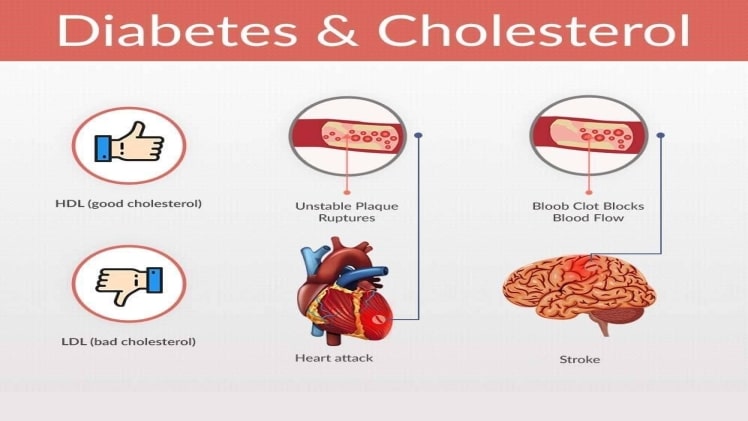Diabetes coupled with high blood cholesterol enhances the risk of heart problems. Read more about cholesterol and how a person can keep cholesterol levels in check.
What is Cholesterol?
Cholesterol is a fat-like material (lipid). Liver makes cholesterol from the foods a person consumes. A person’s body requires cholesterol to function. It is present in almost every body cell. Cholesterol produces cell membranes, hormones, bile acids, and vitamin D. All of these help to digest fat. Cholesterol is fundamental for brain and nerve working. It also helps to produce memories. In excessive levels, it may harm a person’s health. High blood cholesterol enhances the risk of heart problems and stroke. If a person is diabetic and has high blood cholesterol, the risk of these ailments is even higher. If you have a problem of high blood sugar level and cholesterol too then it may lead to heart problems.
How diabetes affects blood cholesterol?
Diabetes degenerates the levels of blood cholesterol (lipid profile) by:
- elevating the levels of fat particles (triglycerides) in the blood
- reducing the levels of “good” cholesterol (HDL) in the blood
- elevating the levels of “bad” cholesterol (LDL) in the blood
Cholesterol is not water-soluble. Lipoproteins are the cholesterol carriers. And they are like taxis moving around the bloodstream and collecting the cholesterol. Likewise, triglyceride requires to be carried by lipoproteins as well. You may require to go for the HbA1c test quite frequently so that you always aware of your sugar levels.
Sugar intake negatively influences “good and bad” cholesterol
Standard cholesterol assessment indicates the total cholesterol broken down by LDL, HDL, and triglycerides. Rise of LDL is associated partly with saturated fat consumption. How is glucose a chief culprit in cholesterol issues? Having glucose and other carbs elevates the triglycerides and reduces HDL. Besides, it causes impaired changes in LDL molecules. LDL levels might appear normal. Yet, this impaired LDL might bring about quick clogging of arteries and enhanced risk for thrombosis.
Cholesterol and Lipoprotein
HDL picks up excess cholesterol. And then, removes it from the blood. Due to this, cholesterol does not accumulate on the blood vessel walls. And this does not inhibit the blood flow to vital organs. Having greater HDL cholesterol levels reduces the risk of cardiovascular problems. Because of this, HDL cholesterol is referred to as “good” cholesterol.
LDL, conversely, keeps too much cholesterol in the blood. There it accumulates slowly to form plaque. Plaque attracts the formation of clot. Also, results in hardening and narrowing of blood vessels. LDL is bad as greater levels may enhance the risk of heart problems.
Triglycerides are natural fat prepared by the body from the consumed foods. Excessive triglycerides in the blood may also be a risk factor for heart ailments.
How to improve the blood cholesterol?
- Check the level of blood cholesterol every year. There is a need of frequent testing in case a person is:
- taking cholesterol-lowering medicines
- has added cardiovascular risk factors like obesity, hypertension)
- has a habit of smoking
- Control the level of blood cholesterol. Good diabetes care demands:
- Blood glucose control
- Blood cholesterol control
- Blood pressure control
Many physicians would suggest that a person should lower LDL cholesterol. He or she should aim for a level below 2.6 mmol/L2. Besides consuming cholesterol medicines, maintaining healthy weight, healthy eating habits, and exercising regularly helps a person manage cholesterol. Also, they reduce the risk of getting heart problems. A doctor might suggest a lifestyle change before suggesting medicines for a person:
- with a history of diabetes for below 10 years
- free of any added cardiovascular risk factors.
Here are a few tips for a healthy lifestyle:
Healthy eating habits
- Have more wholegrains.
- Consume red meats in limits.
- Limit the intake of alcohol.
- Opt for healthy fats and oils.
Healthy weight
- Check weight and waist circumference.
- In an overweight person, losing 5 to 10% of the body weight improves cholesterol levels. This is possible via healthy eating and regular exercise.
Regular physical activity
- Exercise for a minimum of 150 minutes every week. Split it into one 30-minute session or three 10-minute sessions per day, five days each week. Club them with resistance exercise 2 or more times each week.
Lowering glucose consumption offers big rewards
Nowadays, the goal of many individuals is to lower the daily sugar consumption. Also, reduce the carbs to reduce the cholesterol problems. Avoid high fructose corn syrup as well. The brain fails to sense this sugar form like for regular table sugar. This would cause a person to consume more before feeling full. As per reports, after 5 days of having fewer carbs, a person feels:
- much more energetic
- less stressed, and,
- starts craving healthier food options
Hence, every person must gift his or her body a perfect health. Dump the glucose and cut down the carbs. Your heart, body, and mind would definitely thank you for it.

